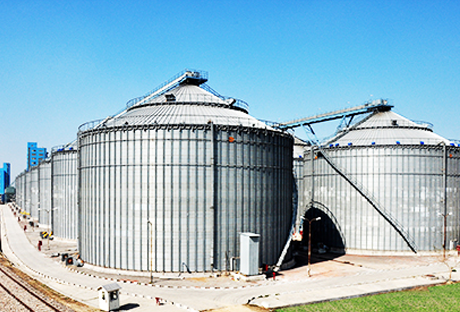Silo Storage
Adani Agri Logistics Limited (AALL) has signed an exclusive service agreement with the Food Corporation of India. The project has been implemented at a total cost of nearly Rs. 700 crores.
The key feature of the project is that the entire handling of the food grains, right from receiving at Base Depots, cleaning and drying as well as storage and transportation to field depots is carried out in bulk form, thus minimizing the losses. These units are notified procurement centers of FCI, where farmers deliver their produce directly in bulk form.
Fully automated operation ensures quick service, transparent & accurate transactions at all stages and timely payment to farmers.


Conventional Storage Vs Silo Storage
- Silos need 1/3rd of the land as compared to a conventional warehouse
- High tech preservation techniques ensure quality and nutrition
- Negligible losses, lesser threat from weather or other external forces
- Improved shelf life of food grains
- Real time monitoring of grains for grain temperature, humidity & infestation
- Transportation to Field Depots by specialized rail wagons in bulk

Empowering India from its roots - Farmers

- Adani’s Base Depots are declared as notified ‘market yards’
- Farmers may deliver stocks directly without involving 'commission agent’
- Efficient clearing of mandis during season; hence no glut
- Savings for farmers on Unloading and Cleaning
- Service Time to farmer: 1 hr as compared to 2-3 days in the conventional system
Partnering government towards food security
- Savings in Gunny Bags, Wooden Crates and Tarpaulin Covers for the Government.
- Economical linkages to Rail head.
- Economical end-to-end supply chain.
- Delivery of Food grains in bulk/bagged form to FCI at field depots without loss, damage, or other degradation of quality beyond specified limits.
- Ensures food security with negligible losses to grains.
- Collectively, this forms an integrated supply chain and logistics model that procures food grains from farmers and local mandis & supplies to PDS.


Features
- AALL handles 5,75,000 MT of food grain for FCI in the states of Punjab, Haryana, Tamilnadu, Karnataka, Maharashtra and West Bengal. Another 3,00,000 MT of food grain is handled for Govt. of Madhya Pradesh. Additionally, AALL has expanded its footprints in Bihar, UP, Punjab, Haryana, Maharashtra & Gujarat with upcoming capacity of 400000 MT.
Wheat is stored in GI Sheet (Steel) silos. The silos are fully covered and have an elaborate system for preservation of wheat.The most important features of the facility are as follows:
- Central Control System using state-of-the-art PLC systems, for automatic operations of the facility.
- High-end monitoring equipment for checking critical quality parameters like moisture content, foreign matter, live infestation etc.
- Modern cleaning and drying operations, through sieves, magnetic separators etc. to remove dust, tailings and other foreign matter.
- Silos are equipped with temperature monitoring system. In case the temperature inside the silos increases, the automatic aeration system starts functioning.
- Insect monitoring system helps in switching on the advanced fumigation system for preservation of the food grains. The phosphine generator uniformly distributes phosphine inside the silos in case of infestation; this ensures that the wheat is free from insects.
- Fire hydrant systems, superior material handling systems, full security cover, watch towers and wireless systems.
- The transportation of the stored food grain is in specially designed covered wagons, capable of handling bulk food grains (which are top loading and bottom discharge).
- Adani Agri Logistics has procured seven rakes, each consisting of 50 wagons.
- The automatic wagon loading system allows loading of one full rake in less than five hours, without involving manual labor.
- The bulk transportation in these wagons ensures minimal transit losses.
- The food grain transported from the base depots is stored at the field depots with similar preservation and storage facilities, in bulk form. Then they are delivered to FCI both in bulk and bagged form as per the requirements at the field depots.


